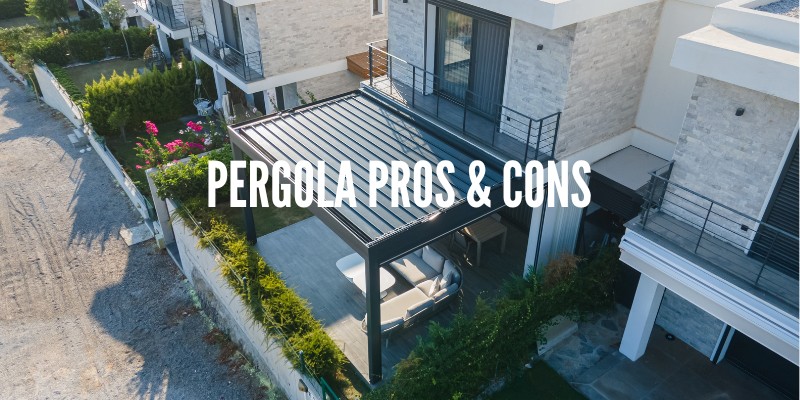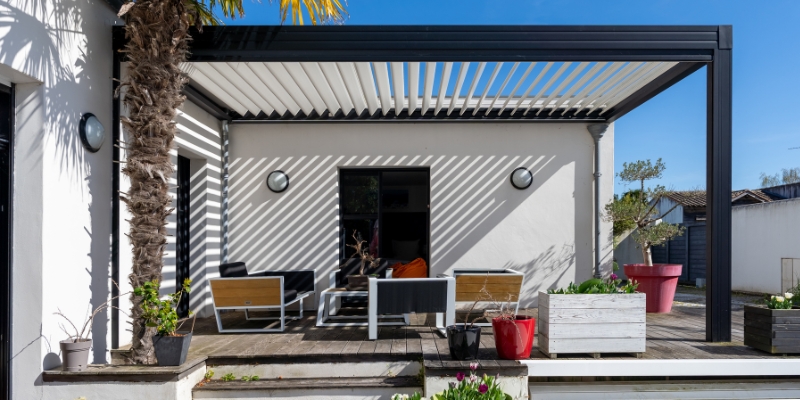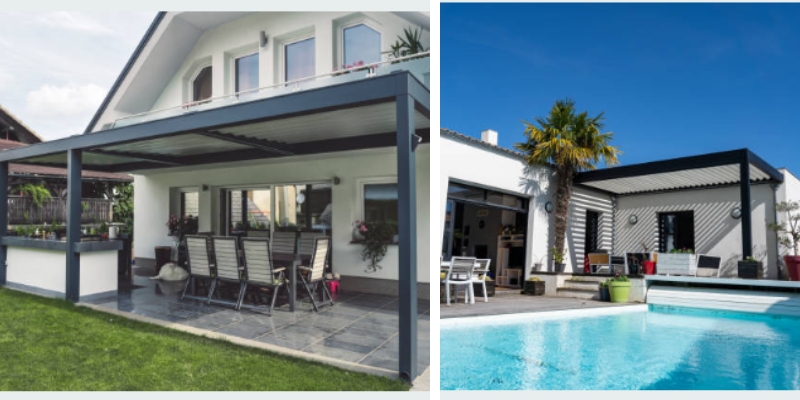
When it comes to enhancing your outdoor living space, brace yourself for the potential game-changing addition of a pergola. However, before embarking on your investment journey, it is imperative to acquire a comprehensive understanding of the pergola’s inherent pros and cons.
From wooden pergolas made of pressure-treated pine to aluminum pergola kits that have gained popularity in recent years, the variety is wide and each comes with its own set of advantages and drawbacks.
Within the confines of this article, we will delve into the depths of the pergola universe, unearthing the multitude of benefits they offer, the potential drawbacks that may arise, and the essential maintenance.
Pros of Pergolas
1. Enhances Outdoor Aesthetics
A pergola can dramatically transform your outdoor living space, enhancing its aesthetic appeal in a unique and attractive way. Whether it’s a wooden pergola adding a rustic charm or a modern aluminum pergola kit bringing a sleek, contemporary vibe, the presence of such a structure instantaneously elevates the ambiance of your backyard.
And it’s not just about the pergola itself. The shadows that a pergola cast throughout the day create intriguing patterns, adding depth and dynamic interest to your patio or garden.
When adorned with climbing plants or vines, pergolas turn into verdant archways, becoming a natural spectacle that’s hard to ignore.
2. Increases Property Value
Pergolas don’t just serve as a beautiful addition to your outdoor space; they can also be a financially savvy investment. By adding a pergola to your property, you’re effectively increasing its value.
In the current real estate market, outdoor living areas have become a significant selling point, and structures like pergolas that enhance these spaces can influence potential buyers positively.
The additional functional space is a big plus in the eyes of potential buyers.
Furthermore, the addition of aluminum pergolas presents an enticing proposition. These structures boast impressive durability and require minimal maintenance, setting them apart from their wooden and vinyl counterparts.
3. Versatility in Design
One of the significant pros of pergolas is the incredible versatility they provide in terms of design. Whether you’re striving for a rustic, classic feel with wooden pergolas, or aiming for a modern, sleek ambiance with aluminum pergolas, there’s a design to match your vision.
Wood pergolas, often crafted from very durable wood like cedar or pressure-treated pine, offer a traditional aesthetic. They can blend seamlessly with a more classic style home or garden.
However, if you’re interested in a more contemporary and modern design, aluminum pergola kits offer an excellent alternative for an affordable price. Particularly, retractable louvered aluminum pergolas lend a modern, chic touch to your outdoor living space.
You can even emulate the wood texture with your metal frame pergolas. Through the process of powder coating, a textured finish can be applied to the aluminum surface, mimicking the grain and feel of wood.
4. Durability
Durability is an important consideration when investing in an outdoor structure like a pergola, and this is where aluminum pergolas really shine. These structures are built to endure various weather conditions, ranging from scorching sun to torrential rain, ensuring a remarkable lifespan.
Compared to wooden pergolas, which can suffer from the effects of weather exposure over time, aluminum pergolas stand strong. They resist damage from wetter and saltier conditions, and unlike wood, they’re impervious to termites.
Furthermore, aluminum doesn’t splinter or warp as wood can, and there’s no need to apply a new coat of paint or sealant to protect it from the elements.
More than just withstanding the weather, these pergolas also require less maintenance. The occasional wipe down to keep it clean is often all that’s needed, saving you valuable time maintaining your outdoor living area.
5. Easy Installation
Among the myriad advantages of pergolas, the ease of installation stands out, particularly in the case of aluminum pergolas. For homeowners who relish DIY endeavors, the sheer simplicity of assembling a pergola from a kit is a delightful prospect.
The ready-to-install pergola kits typically come with pre-drilled holes and detailed, easy-to-understand instructions. This thoughtful design saves you from the hassle and the guesswork often associated with constructing outdoor structures. Plus, it removes the need for specialized tools or equipment – a standard toolbox often suffices.
Even if you choose a more intricate design, like a louvered pergola, the assembly process remains straightforward thanks to the step-by-step guidance provided.
What’s more, the easy installation process doesn’t compromise the pergola’s stability or durability. Aluminum pergola kits are designed to withstand various weather conditions, proving that simplicity doesn’t sacrifice quality.
6. Customization Options
One of the distinct advantages of pergolas is the extensive range of customization options they provide. This versatility means that no matter your lifestyle or aesthetic preference, there’s a pergola that can be tailored to fit your needs.
For instance, if your goal is to create an outdoor living space that provides just the right amount of sun and shade, you might consider adding retractable aluminum louvered pergolas. This feature can easily be included in modern aluminum pergolas or classic wooden designs, providing more shade and comfort on hotter days.
Meanwhile, if you’re keen on using your pergola during the evening hours, integrating outdoor lighting is a fantastic option. These lights can illuminate your space, extending your outdoor enjoyment well into the night.
If privacy is a concern, latticework or drapes can be added to the sides of your pergola, creating a secluded haven in your backyard.
This ensures your pergola is not only beautiful but also functionally apt.
From adjusting the pergola’s height to adding on extra items for added comfort, the possibilities for personalization are practically limitless.
Cons of Pergolas
1. Maintenance
While the charm and beauty of pergolas are undeniable, they do come with their own set of upkeep requirements that potential owners should be aware of. Regular maintenance is a critical aspect of owning a pergola and ensuring its longevity, especially wooden pergolas.
Wooden pergolas, whether made from cedar, pressure-treated pine, or another type of very durable wood, require ongoing care to maintain their appearance and structural integrity. This care often includes applying a new coat of wood stain or sealant to protect the wood from the elements and repel insects.
Moreover, natural occurrences like paint splinters or a shift from the original cedar shade to a light red-brown are common with wooden pergolas. To keep the pergola looking its best, you may find yourself dedicating time to sanding and repainting the structure, or applying a new layer of sealant to restore the wood’s vibrant color and protect it from damage.
2. Attraction to Insects
Pergolas, with their alluring beauty and charm, possess an intriguing quality that captivates not only humans but also a diverse array of insects.
Termites, carpenter ants, and other wood-boring insects can find the structure of a wooden pergola quite attractive. While the outdoor structure can bring style and elegance to your outdoor living space, it can simultaneously become a potential home for these unwanted guests.
Cedar, a very durable wood often used in pergola construction, naturally repels insects to a certain extent.
However, other types of wood, especially if not pressure-treated, may be more susceptible to insect infestation. The damage from these pests can compromise the structural integrity of the pergola over time, leading to potential safety issues and added maintenance or repair costs.
3. Permit Requirements
While picturing your dream outdoor living space with a beautiful pergola might be straightforward, the administrative aspect of making this dream a reality might be a little more complicated.
Depending on your location, you might need a building permit before adding a pergola to your property.
Obtaining a permit may indeed seem more like a bureaucratic obstacle than a genuine disadvantage of pergolas. Still, it is an important step that can impact your project’s timeline and potentially even its cost. Failing to secure the necessary permit could result in penalties or require modifications to the pergola after it’s been built.
If you’re planning to enhance your backyard with a pergola, it’s wise to check your local building codes and regulations first.
During my whole work experience, I could estimate that 80 percent of our clients across the country do not need a permit for a pergola, but please check with your local municipality to be sure.
4. Limited Weather Protection
Pergolas, by design, offer a picturesque accent to your outdoor living space. However, their open structure offers limited protection against certain weather conditions. This is especially true for fiberglass, and vinyl pergolas, which, despite their general durability, have specific susceptibilities.
For instance, high winds might cause fiberglass pergolas to sway or even tip over if they aren’t adequately secured. Similarly, heavy snowfall can put a significant strain on the structure, potentially causing damage.
Vinyl pergolas are lauded for their low maintenance requirements, but they’re not without their weaknesses either. Prolonged exposure to sunlight can lead to discoloration over time, fading the vibrant white or colored finish to a less attractive hue.
While it’s worth noting that these circumstances reside on the extreme end of the spectrum, their relevance remains highly contingent upon the unique characteristics of your local climate. In regions blessed with milder weather patterns, these deliberations might not warrant substantial concern.
Still, it’s worth noting that pergolas made from metal, specifically adjustable louvered aluminum, are often more resilient in adverse high winds or any other harsh weather conditions.
The best thing is that aluminum pergola kits are now widely available.
Conclusion
Although we’ve explored some pergola disadvantages associated with certain materials, it’s clear that the pros of pergolas significantly outweigh these cons, especially when you opt for durable, low-maintenance options like aluminum pergolas.
Despite the limited weather protection offered by pergolas and the maintenance requirements of certain materials, the aesthetic charm, versatility in design, property value enhancement, and customization options that pergolas bring are hard to overlook.
Ultimately, if you’re looking to add a low-maintenance, beautiful structure to your backyard, aluminum pergola kits stand out as a suitable choice. These modern, adjustable louvered pergolas offer a balance of durability, easy installation, and customization options, making them a preferred option for many homeowners seeking to elevate their outdoor living spaces.
Always remember, the right pergola for you hinges on your personal preferences, lifestyle, and local weather conditions. So, make a well-informed decision and enhance your outdoor living experience with the addition of a pergola. I hope that these pergola pros and cons will help you to make a decision.


